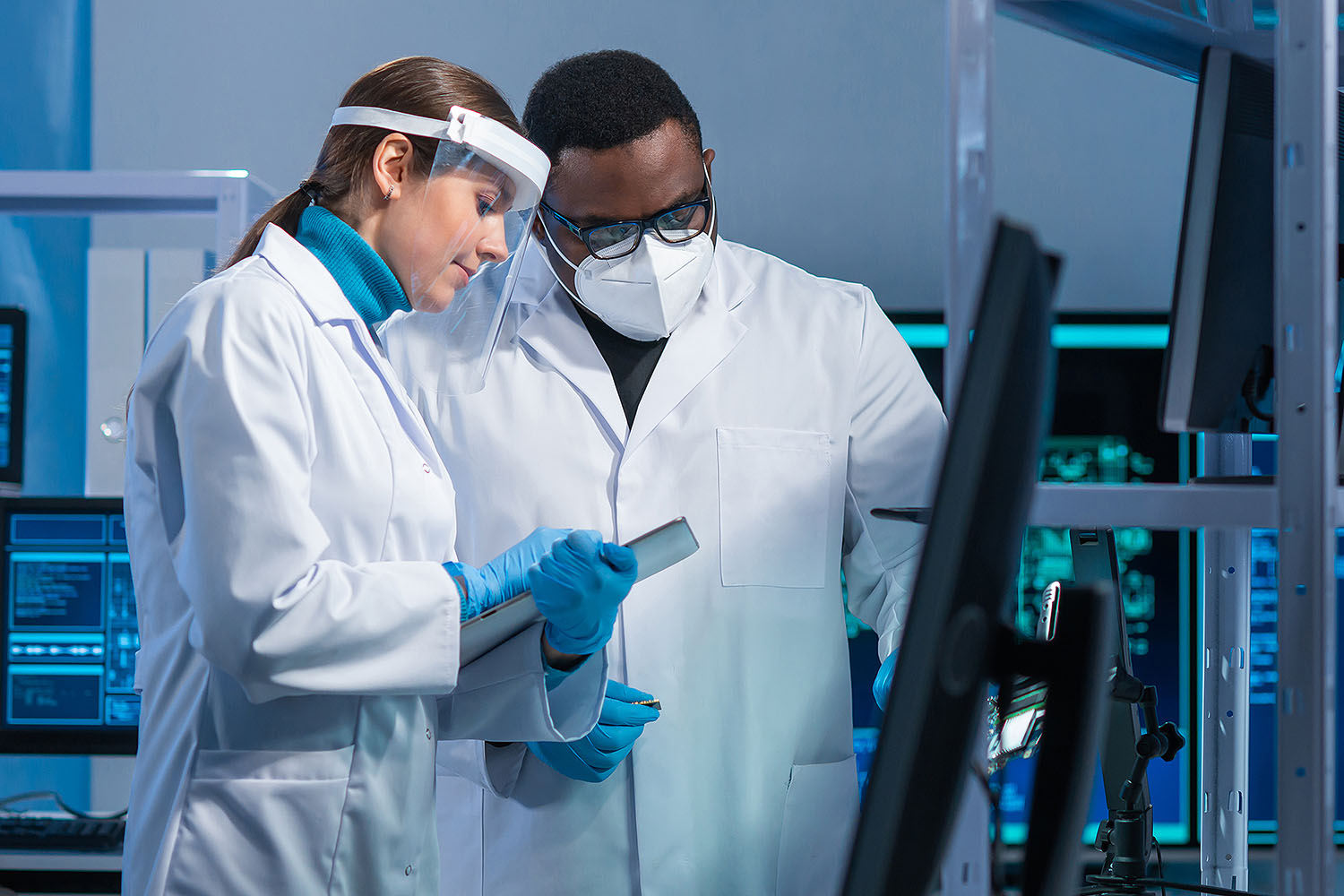Medical Biophysics Overview

Medical biophysics is one of the burgeoning career paths of tomorrow that you can embark on today when you seek a Master of Science or doctorate in medical biophysics through Clemson University’s College of Science.
The graduate-level degrees in medical biophysics focus on understanding the interconnection between fundamental physics principles and complex biological and medical phenomena, and how the application of those principles can help solve biomedical challenges and provide better health outcomes for everyone.
Diverse Scientific Backgrounds
Participants in the medical biophysics program will join other students from diverse scientific backgrounds to work collaboratively in a highly interdisciplinary research environment with faculty associated with multiple Clemson departments and colleges, as well as with strategic partners at the Health Sciences Center at Prisma Health, and with Clemson’s Center for Biomedical Research Excellence, including the Clemson Center for Human Genetics, the Eukaryotic Pathogen Innovations Center and the Center of South Carolina Translational Research Improving Musculoskeletal Health.

Plans of Study
Master of Science in Medical Biophysics
The Master of Science in Medical Biophysics degree is a two-year program, during which the successful student will earn 30 credit hours. The program is offered online to allow people already in the workforce to keep their jobs while taking classes. The first year is focused on core disciplinary coursework; after completing the first-year coursework, students have the option to conduct research in their workplaces under the supervision of participating MBIO faculty.
Admissions will be reviewed by a committee comprising members from all participating university departments. The admission requirements are flexible to allow admission of students from diverse backgrounds, while meeting all university requirements.
Doctorate in Medical Biophysics
The Doctorate in Medical Biophysics degree requires an additional three years of study that builds on the foundation successful students will have developed during their first two years in the medical biophysics program. In these final three years, students will be required to take elective courses based on personalized recommendations from each student’s advisory committee.
Admissions will be reviewed by a committee comprising members from all participating university departments. The admission requirements are flexible to allow admission of students from diverse backgrounds, while meeting all university requirements.

Take the Next Step
Medical biophysics is one of the burgeoning career paths of tomorrow. If medical biophysics sounds like a career path you would like to follow, let’s connect. Contact Emil Alexolv, program director, via email at ealexov@clemson.edu, or call 864-656-3416.
Apply NowResources for Students
Find Out More
If you are interested in the medical biophysics program at Clemson, the following accordions offer information and resources that may be helpful.
-
Medical Biophysics Curriculum
View or download the program overview PDFs:
- Overview of M.S. program (PDF)
- Overview of Ph.D. program (PDF)
MBIO 8100 Medical Biophysics Core 1: Molecular and Cellular Medical Biophysics: This course provides basic knowledge in molecular and cellular medical biophysics and linkage with diseases. It will be taught jointly by Clemson University instructors and medical doctors at Prisma Health. This course will outline the macromolecules in living cells (DNA, RNAs and proteins) as well as the structure and properties of living cells. It will also introduce major experimental and computational techniques at molecular and cellular level. Molecular effects, molecular mechanisms and plausible biomarkers will be discussed as well. In addition to regular quizzes and exams, students will take written and oral exams at the end of the semester.
MBIO 8110 Medical Biophysics Core 2: Medical Biophysics at Larger Scale: Tissues and Organs: This course will provide basic knowledge in tis- sue and human organs. It will be taught jointly by Clemson University instructors and medical doctors at Prisma Health. It will introduce students to major experimental and computational techniques used to study tissues and human organs. Examples of human diseases and their manifestation will also be outlined by Prisma instructors. The course ends with a set of lectures demonstrating the linkage between disease-causing effects at molecular and cellular levels and the corresponding observations at tissue level, as well as overall human health. In addition to regular quizzes and exams, students will take written and oral exams at the end of the semester.
MBIO 8210 Medical Biophysics Core 3: Medical Biophysics and Human Health: This course offers training in utilizing big data and medical records. A significant component of the course will be ethical issues in dealing with human subjects. Current developments in the areas of personalized medicine and pharmacogenomic/pharmacogenetics as well as state-of-the-art achievements in develop- ing biosensors and drug development will be taught as well. In addition to regular quizzes and exams, students will take written and oral exams at the end of the semester.
MBIO 8220 Medical Biophysics Core 4: Prisma/Clemson University Seminar Series: The course provides students with an overview of the research being done at Prisma Health. The course also provides a forum for students to participate in scientific discussions and in-per- son conversations. Students discuss biophysics and medical research, including their own work; the research of their colleagues; and research from the field in a critical but constructive and collaborative manner.
MBIO 9910 MBIO Graduate Research: This course allows students to conduct research in desired labs of associated faculty, and to acquire skills to generate and analyze data related to medical biophysics. Students are allowed to rotate over several labs to explore different subjects and types of research. The course has two components: learning the exist- ing computational and experimental methods in the corresponding lab, and training in how to conduct research and present findings. The doctorate degree requirements include all course- work for the master’s degree plus an additional three years of research in the labs of participating faculty and taking elective courses recommended by each student’s advisory committee.
-
Resources for Current Students
Current graduate students may find the following links containing department and University policies helpful:
-
Prospective Students
The following information is required to apply to the College of Science Medical Biophysics Program (M.S. and Ph.D.):
- Application form: Use the online submission at The Graduate School.
- Application deadlines:
- M.S.: July 31 for Fall admission in the same calendar year or Spring admission in the following calendar year
- Ph.D.: January 1 for Fall admission, May 1 for Spring admission
- Application fee: There is no fee to apply for the M.S. or Ph.D. program in medical biophysics.
- Transcripts: One unofficial copy of transcripts from every college or university attended. Official transcripts are required upon acceptance. Do not send official transcripts until accepted.
- Personal statement (no more than two pages): The statement should outline the applicant’s reasons for seeking graduate education, research areas of interest, research experience, long-term career goals that incorporate the importance of a graduate degree, and rationale for wanting to work with the particular faculty advisor(s) listed on the application. However, the admitted students are allowed change their advisor in the course of the study, if they want.
- List of up to three faculty of interest to you (not needed for M.S. applicants): It is highly recommended that an applicant contact faculty of interest prior to applying. The faculty member listed first would be the students intended advisor. List “rotation” in the first slot if you wish to enter the rotation program and then in the next two spots list faculty with whom you would like to conduct a lab rotation. Students may conduct lab rotations with faculty other than those identified here.
- Letters of recommendation: Three are required for Ph.D. applicants; two are required for M.S. applicants. These letters should come from people who can talk about your academic skills; experience, interest and potential in research; and your work ethic. None of these letters may come from a prospective advisor at Clemson.
- TOEFL, IELTS, or Duolingo English test scores (no more than 2 years old): Because of the strong communication component of graduate degree programs, non-native speakers of English should have a TOEFL score of at least 102 (out of 120) with a speaking score greater than 20, an IELTS score of at least a 7.5 or a Duolingo English Test score of at least 120.
- GRE: Not required.
- Online interview: Online interviews will be carried out prior final decision of acceptance.
-
Information for Accepted Students
After you have applied to Clemson, the status of your application for graduate study submitted through the Clemson University Graduate School can be checked online. If your status shows as accepted, this means you qualify for admission to the program. You will not officially be admitted to the graduate program until all final and official transcripts and test scores are received.
If you are accepted
After students are admitted, the Department of Physics and Astronomy makes all assistantship decisions. The Graduate School cannot tell you more about that status. It will typically take two more weeks before you receive official notification of an assistantship offer or if you are on the waiting list for an offer. If you are offered an assistantship, you must sign the letter and return it to accept the offer. All offers remain valid until April 15 (for admission to the fall semester) or Nov. 30 (for admission to the spring semester), after which they may be offered to other applicants. If you do not plan to accept our offer, please inform us as soon as possible so we may offer the position to another candidate. Note that fall classes begin in mid-August, and orientation for teaching assistants begins the first week of August. Plan to arrive in Clemson by the first day of orientation if you will be a teaching assistant for the fall semester. For the schedule for spring admissions, please contact the department.
-
Participating Faculty
College of Science
Physics and Astronomy
Genetics and Biochemistry
School of Mathematical and Statistical Sciences
Biological Sciences
Chemistry
College of Engineering, Computing and Applied Sciences
Bioengineering
Chemical and Biomolecular Engineering
Materials Science and Engineering
Environmental Engineering and Earth Sciences
Mechanical Engineering and Bioengineering
College of Behavioral, Social and Health Sciences
School of Nursing
-
Graduate School: Find Out More
For general information about The Graduate School at Clemson, as well as the most current degree requirements and course listings, visit the Records and Registration page.
Rewarding Careers
The median national wages for medical biophysics-related occupations as of 2022 show just how rewarding a career in this field can be.
- Biochemists and biophysicists: $103,810
- Medical scientists: $99,930
- Data scientists: $103,500
- Medical and health-services managers: $104,830
- Software developers: $127,260
- Quality assurance analysts: $99,620
